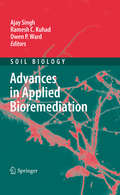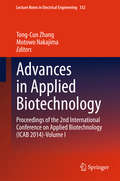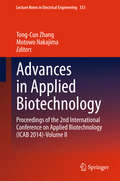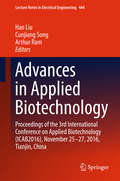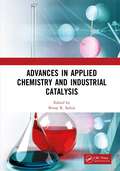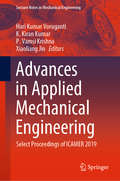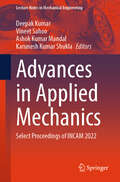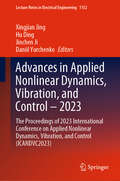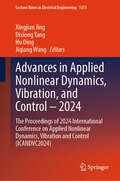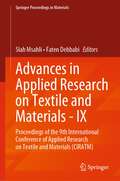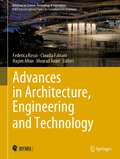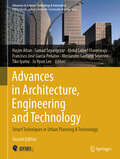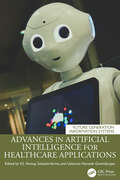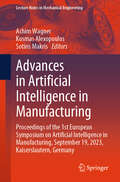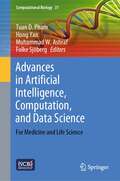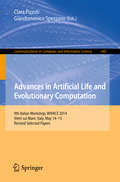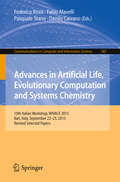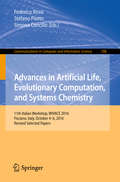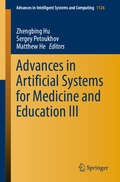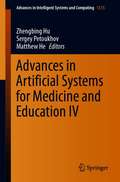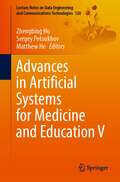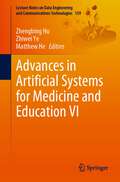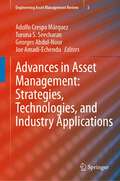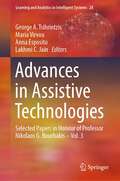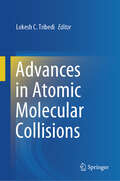- Table View
- List View
Advances in Applied Bioremediation (Soil Biology #17)
by Ajay Singh Ramesh C. Kuhad Owen P. WardBioremediation is a rapidly advancing field and the technology has been applied successfully to remediate many contaminated sites. The goal of every soil remediation method is to enhance the degradation, transformation, or detoxification of pollutants and to protect, maintain and sustain environmental quality. Advances in our understanding of the ecology of microbial communities capable of breaking down various pollutants and the molecular and biochemical mechanisms by which biodegradation occurs have helped us in developing practical soil bioremediation strategies. Chapters dealing with the application of biological methods to soil remediation are contributed from experts - authorities in the area of environmental science including microbiology and molecular biology - from academic institutions and industry.
Advances in Applied Biotechnology: Proceedings of the 2nd International Conference on Applied Biotechnology (ICAB 2014)-Volume I (Lecture Notes in Electrical Engineering #332)
by Tong-Cun Zhang Motowo NakajimaAt the ICAB 2014, researchers from around the world will gather to discuss the latest scientific research, findings and technologies concerning Microbial Genetics and Breeding, Optimization and Control of Biological Processes, Biological Separation and Biological Purification, and Advances in Biotechnology. This conference will provide a platform for academic exchange on the application of biotechnology between domestic and international universities, research institutes, corporate experts and scholars. The participants will focus on the international development and future trends. The event will lay a solid foundation for addressing key technical challenges in various areas of applied biotechnology, providing opportunities to promote the development and expansion of the biotechnology industry.
Advances in Applied Biotechnology: Proceedings of the 2nd International Conference on Applied Biotechnology (ICAB 2014)-Volume II (Lecture Notes in Electrical Engineering #333)
by Tong-Cun Zhang Motowo NakajimaAt the ICAB 2014, researchers from around the world will gather to discuss the latest scientific research, findings and technologies concerning Microbial Genetics and Breeding, Optimization and Control of Biological Processes, Biological Separation and Biological Purification, and Advances in Biotechnology. This conference will provide a platform for academic exchange on the application of biotechnology between domestic and international universities, research institutes, corporate experts and scholars. The participants will focus on the international development and future trends. The event will lay a solid foundation for addressing key technical challenges in various areas of applied biotechnology, providing opportunities to promote the development and expansion of the biotechnology industry.
Advances in Applied Biotechnology: Proceedings of the 3rd International Conference on Applied Biotechnology (ICAB2016), November 25-27, 2016, Tianjin, China (Lecture Notes in Electrical Engineering #444)
by Hao Liu Cunjiang Song Arthur RamThis book presents and discusses the latest advances in biotechnology, and selected challenges and opportunities in connection with its industrial applications. It gathers the proceedings of the 3rd International Conference on Applied Biotechnology (ICAB2016), held on November 25-27, 2016 in Tianjin, China, which continued the success of the previous biennial ICAB conferences, providing a platform for scientists and engineers to exchange ideas about the frontiers of biotechnology. Topics include (but are not limited to) microbial genetics and breeding; biological separation and purification; optimization and control of biological processes; and advances in biotechnology. Offering key insights into the latest breakthroughs, the book is intended for industrial leaders, professionals and research pioneers in the field of applied biotechnology.
Advances in Applied Chemistry and Industrial Catalysis: Proceedings of the 3rd International Conference on Applied Chemistry and Industrial Catalysis (ACIC 2021), Qingdao, China, 24-26 December 2021
by Binoy K. SaikiaPresenting a collection of papers resulting from the conference on "Applied Chemistry and Industrial Catalysis (ACIC 2021), Qingdao, China, 24-26 December 2021". The theme of the conference was: "Clean Production and High Value Utilization", discussing how to reduce the environmental footprint at the source and produce high value-added end products in chemical manufacturing. The conference brought together scholars from the Chinese government, top universities, business associations, research centers and high-tech enterprises, and was committed to building and enabling a platform for the cooperation among the Chinese government, Chemical industry, and scholars. The goal was to build a bridge between R&D results and the Chemical industry. The conference conducted in-depth exchanges and discussions on relevant topics such as applied chemistry and industrial catalysis aiming to provide an academic and technical communication platform for scholars and engineers engaged in scientific research and engineering practice in the field of chemistry, catalysis and function material. By sharing the research status of scientific research achievements and cutting-edge technologies, it helps scholars and engineers all over the world comprehend the academic development trend and broaden research ideas. So as to strengthen international academic research, academic topics exchange and discussion, and promote the industrialization cooperation of academic achievements.
Advances in Applied Mechanical Engineering: Select Proceedings of ICAMER 2019 (Lecture Notes in Mechanical Engineering)
by Hari Kumar Voruganti K. Kiran Kumar P. Vamsi Krishna Xiaoliang JinThis book presents select peer reviewed proceedings of the International Conference on Applied Mechanical Engineering Research (ICAMER 2019). The books examines various areas of mechanical engineering namely design, thermal, materials, manufacturing and industrial engineering covering topics like FEA, optimization, vibrations, condition monitoring, tribology, CFD, IC engines, turbo-machines, automobiles, manufacturing processes, machining, CAM, additive manufacturing, modelling and simulation of manufacturing processing, optimization of manufacturing processing, supply chain management, and operations management. In addition, recent studies on composite materials, materials characterization, fracture and fatigue, advanced materials, energy storage, green building, phase change materials and structural change monitoring are also covered. Given the contents, this book will be useful for students, researchers and professionals working in mechanical engineering and allied fields.
Advances in Applied Mechanics: Select Proceedings of INCAM 2022 (Lecture Notes in Mechanical Engineering)
by Deepak Kumar Vineet Sahoo Ashok Kumar Mandal Karunesh Kumar ShuklaThis book presents select proceedings of the Indian Conference on Applied Mechanics (INCAM 2022). It includes the latest research on solid mechanics, impact mechanics, fluid mechanics, biomechanics, materials science and design engineering. Additional topics covered in this book are additive and advanced manufacturing, mechanics of energetic materials, mechanics in agriculture, flight and drone mechanics, mathematical methods in mechanics and precision metrology. The book is useful for researchers and academics from a broad range of engineering disciplines, such as civil engineering, mechanical engineering, aerospace engineering, automotive engineering, biomedical engineering and material science.
Advances in Applied Nonlinear Dynamics, Vibration, and Control – 2023: The Proceedings of 2023 International Conference on Applied Nonlinear Dynamics, Vibration, and Control (ICANDVC2023) (Lecture Notes in Electrical Engineering #1152)
by Xingjian Jing Jinchen Ji Hu Ding Daniil YurchenkoThis book provides readers with up-to-date advances in applied and interdisciplinary engineering science and technologies related to nonlinear dynamics, vibration, control, robotics, and their engineering applications, developed in the most recent years. All the contributed chapters come from active scholars in the area, which cover advanced theory and methods, innovative technologies, benchmark experimental validations and engineering practices. Readers would benefit from this state-of-the-art collection of applied nonlinear dynamics, in-depth vibration engineering theory, cutting-edge control methods and technologies and definitely find stimulating ideas for their on-going R&D work. This book is intended for graduate students, research staff, and scholars in academics and also provides useful hand-up guidance for professionals and engineers in practical engineering missions.
Advances in Applied Nonlinear Dynamics, Vibration, and Control – 2024: The Proceedings of 2024 International Conference on Applied Nonlinear Dynamics, Vibration and Control (ICANDVC2024) (Lecture Notes in Electrical Engineering #1373)
by Xingjian Jing Jiqiang Wang Hu Ding Dixiong YangThis book aims to provide readers with the latest exciting advancements in applied and interdisciplinary engineering science and technologies, particularly in nonlinear dynamics, vibration analysis and control, control systems theory and methods, robotics, and their various engineering applications developed in recent years. The chapters, contributed by active scholars in these fields, cover advanced systems theory and methods, innovative technologies, benchmark experimental validations, and active engineering practices. Readers will benefit from this cutting-edge collection of applied nonlinear dynamics and control, as well as various stimulating engineering theories, methods, and technologies, finding inspiration for their ongoing R&D work.This book is intended for graduate students, research staff, and scholars in academics and also provides useful hand-up guidance for professionals and engineers in practical engineering missions.
Advances in Applied Research on Textile and Materials - IX: Proceedings of the 9th International Conference of Applied Research on Textile and Materials (CIRATM) (Springer Proceedings in Materials #17)
by Slah Msahli Faten DebbabiThis book presents the proceedings of CIRATM-9. The papers present the latest scientific concepts and technological developments in textile and materials of worldwide researchers and practitioners. The conference promotes sharing ideas and emerging technologies and fosters research and development collaborations amongst academia, research institutions and relevant industries. CIRATM is the first international conference applied on textiles in Tunisia and all Maghreb. It is a regular conference organized every two year since 2004. It focuses on all textile and materials fields. It joints together all actors of textile field and share research with many international collaborators.This edition is organized with the collaboration of 4 Tunisian partners and 6 international associates and institutions· Laboratory of Textile Engineering (LGTex, Tunisia), · Monastir university (Tunisia) · Tunisian Association of Textile Researchers (ATCTex, Tunisia) · Le pôle de compétitivité Monastir-El Fejja (mfcpole, Tunisia) · Association of the universities for textiles (AUTEX, International) · Balkan Society of textile engineering (BASTE) · National research & development institute for textile and leather (INCDTP, Bucharest- Romania) · Yazid University (Iran) · Centre d'Essais Textile (Cetelor, Lorraine - France) · Center of Textile Science and Technology (2C2T – University of Minho, Portugal)
Advances in Architecture, Engineering and Technology (Advances in Science, Technology & Innovation)
by Haşim Altan Federica Rosso Claudia Fabiani Mourad AmerThis book examines a range of subjects with a specific focus on architectural and technological advancements. Architecture is the constant innovation in designing for high efficiency in the performance of buildings, in terms of planning, construction and energy, while maintaining creativity in its form. Moreover, the field of architecture goes hand in hand with that of technology. Nowadays, engineering technology has to cope with the rapid industrialization and urbanization seen in most countries. Furthermore, creative design and construction practices are challenging tasks to the architects and engineers to meet the ever-growing demands of society. Therefore, this book on "Advances in Engineering Science and Architectural Design" is provided to cover a wide range of topics in architecture, engineering, and technology.
Advances in Architecture, Engineering and Technology: Smart Techniques in Urban Planning & Technology (Advances in Science, Technology & Innovation)
by Abdul Lateef Olanrewaju Haşim Altan Ju Hyun Lee Tiko Iyamu Samad Sepasgozar Francisco José García Peñalvo Alessandro Gaetano SeverinoThis book summarizes the latest studies regarding innovation in urban design and planning. It shares many tips and insights about sustainable solutions for the issues facing transport systems, innovative digital technologies, and ICT trends. The book touches upon the need to integrate the three fields of Architecture, Engineering, and Technology that have become indispensable. This is intended to respond to the increasing human needs and population growth in cities on one hand and to develop a holistic approach that helps overcome challenges to sustainability and environment management on the other hand. With the power of engineering in practice, problems of design and development once considered too complex to be dealt with other than empirically, intuitively, or by trial and error, are now becoming more solvable and applicable. This book offers strategies and solutions that enable designers to bring together knowledge in the fields of architecture, engineering, and technology to overcome challenges facing in modern times.
Advances in Artificial Intelligence for Healthcare Applications (Future Generation Information Systems)
by V. S. Anoop Suhasini Verma Usharani Hareesh GovindarajanAdvances in Artificial Intelligence for Healthcare Applications comprehensively covers the theoretical foundations, applications, and research potential of artificial intelligence in the healthcare domain.Features: Discusses advanced concepts such as biomedical large language models, and natural language processing applications Covers machine vision applications for robotics in healthcare, challenges, and trends in rehabilitation devices in healthcare, and robotic interactions and control for wearable devices Presents the Internet of Things-based disease monitoring systems, Internet of nano-things for healthcare applications, and wearable Medical Internet of Things devices for accessible healthcare services Explains the use of artificial intelligence in bone and brain imaging, molecular imaging using artificial intelligence, and medical image segmentation Illustrates the importance of using generative artificial intelligence for clinical documentation, and medical imaging applications using generative artificial intelligence The text is primarily written for senior undergraduates, graduate students, and academic researchers in the fields of electrical engineering, electronics and communications engineering, computer science and engineering, and biomedical engineering.
Advances in Artificial Intelligence in Manufacturing: Proceedings of the 1st European Symposium on Artificial Intelligence in Manufacturing, September 19, 2023, Kaiserslautern, Germany (Lecture Notes in Mechanical Engineering)
by Sotiris Makris Kosmas Alexopoulos Achim WagnerThis book reports on recent developments of artificial intelligence applications in the manufacturing industry. Gathering contributions to the first European Symposium on Artificial Intelligence in Manufacturing, held on September 19, 2023, in Kaiserslautern, Germany, it reports on machine learning models and algorithms for systems monitoring and industrial data management, on advances in human-robot collaboration, and on artificial intelligence applications in industrial control and process monitoring. Giving a special emphasis to the integration of artificial intelligence in manufacturing systems and processes, this book offers a timely and practice-oriented guide to a multidisciplinary audience of engineering researchers, software developers and industrial managers.
Advances in Artificial Intelligence, Computation, and Data Science: For Medicine and Life Science (Computational Biology #31)
by Tuan D. Pham Hong Yan Folke Sjöberg Muhammad W. AshrafArtificial intelligence (AI) has become pervasive in most areas of research and applications. While computation can significantly reduce mental efforts for complex problem solving, effective computer algorithms allow continuous improvement of AI tools to handle complexity—in both time and memory requirements—for machine learning in large datasets. Meanwhile, data science is an evolving scientific discipline that strives to overcome the hindrance of traditional skills that are too limited to enable scientific discovery when leveraging research outcomes. Solutions to many problems in medicine and life science, which cannot be answered by these conventional approaches, are urgently needed for society.This edited book attempts to report recent advances in the complementary domains of AI, computation, and data science with applications in medicine and life science. The benefits to the reader are manifold as researchers from similar or different fields can be aware of advanced developments and novel applications that can be useful for either immediate implementations or future scientific pursuit. Features:Considers recent advances in AI, computation, and data science for solving complex problems in medicine, physiology, biology, chemistry, and biochemistryProvides recent developments in three evolving key areas and their complementary combinations: AI, computation, and data scienceReports on applications in medicine and physiology, including cancer, neuroscience, and digital pathologyExamines applications in life science, including systems biology, biochemistry, and even food technology This unique book, representing research from a team of international contributors, has not only real utility in academia for those in the medical and life sciences communities, but also a much wider readership from industry, science, and other areas of technology and education.
Advances in Artificial Life and Evolutionary Computation: 9th Italian Workshop, WIVACE 2014, Vietri sul Mare, Italy, May 14-15, Revised Selected Papers (Communications in Computer and Information Science #445)
by Clara Pizzuti Giandomenico SpezzanoThis book constitutes the revised selected papers of the 9th Italian Workshop on Advances in Artificial Life and Evolutionary Computation held in Vietri sul Mare, Italy, in May 2014, in conjunction with the 24th Italian Workshop on Neural Networks, WIRN 2014. The 16 papers presented have been thoroughly reviewed and selected from 40 submissions. They cover the following topics: artificial neural networks; fuzzy inference systems; rough set; approximate reasoning; and optimization methods such as evolutionary computation, swarm intelligence, particle swarm optimization.
Advances in Artificial Life, Evolutionary Computation and Systems Chemistry: 10th Italian Workshop, WIVACE 2015, Bari, Italy, September 22-25, 2015, Revised Selected Papers (Communications in Computer and Information Science #587)
by Pasquale Stano Federico Rossi Fabio Mavelli Danilo CaivanoThis book constitutes the revised selected papers of the 10th Italian Workshop on Advances in Artificial Life, Evolutionary Computation and Systems Chemistry, WIVACE 2015, held at Bari, Italy, in September 2015. The 18 papers presented have been thoroughly reviewed and selected from 45 submissions. They cover the following topics: evolutionary computation, bioinspired algorithms, genetic algorithms, bioinformatics and computational biology, modeling and simulation of artificial and biological systems, complex systems, synthetic and systems biology, systems chemistry.
Advances in Artificial Life, Evolutionary Computation, and Systems Chemistry: 11th Italian Workshop, WIVACE 2016, Fisciano, Italy, October 4-6, 2016, Revised Selected Papers (Communications in Computer and Information Science #708)
by Federico Rossi Stefano Piotto Simona ConcilioThis book constitutes the revised selected papers of the 11th Italian Workshop on Advances in Artificial Life, Evolutionary Computation and Systems Chemistry, WIVACE 2016, held at Fisciano, Italy, in October 2016. The 16 full papers together with 1 short papers presented have been thoroughly reviewed and selected from 54 submissions. They cover the following topics: evolutionary computation, bioinspired algorithms, genetic algorithms, bioinformatics and computational biology, modelling and simulation of artificial and biological systems, complex systems, synthetic and systems biology, systems chemistry.
Advances in Artificial Systems for Medicine and Education III (Advances in Intelligent Systems and Computing #1126)
by Sergey Petoukhov Matthew He Zhengbing HuThis book discusses the latest advances in the development of artificial intelligence systems and their applications in various fields, from medicine and technology to education. It comprises papers presented at the Third International Conference of Artificial Intelligence, Medical Engineering, Education (AIMEE2019), held at the Mechanical Engineering Institute of the Russian Academy of Sciences, Moscow, Russia, on 1–3 October 2019. Covering topics such as mathematics and biomathematics; medical approaches; and technological and educational approaches, it is intended for the growing number of specialists and students in this field, as well as other readers interested in discovering where artificial intelligence systems can be applied in the future.
Advances in Artificial Systems for Medicine and Education IV (Advances in Intelligent Systems and Computing #1315)
by Sergey Petoukhov Matthew He Zhengbing HuThis book covers the latest advances for the development of artificial intelligence systems and their applications in various fields from medicine and technology to education. The proceedings comprise refereed papers presented at the Fourth International Conference of Artificial Intelligence, Medical Engineering, Education (AIMEE2020), held at the Mechanical Engineering Institute of the Russian Academy of Sciences, Moscow, Russia, in 3–4 October 2020. Given the rapid development of artificial intelligence systems, the book emphasizes the need for the intensification of training of a growing number of relevant specialists, in particular, in medical engineering to increase the effectiveness of medical diagnosing and treatment. In digital artificial intelligence systems, scientists endeavor to reproduce the innate intellectual abilities of human and other organisms, and the in-depth study of genetic systems and inherited biological processes can provide new approaches to create more and more effective artificial intelligence methods. Topics of the included papers concern thematic materials in the following spheres: mathematics and biomathematics; medical approaches; technological and educational approaches. The book is a compilation of state-of-the-art papers in the field, covering a comprehensive range of subjects that is relevant to business managers and engineering professionals alike. The breadth and depth of these proceedings make them an excellent resource for asset management practitioners, researchers, and academics, as well as undergraduate and postgraduate students interested in artificial intelligence and bioinformatics systems as well as their growing applications. Intended readership includes specialists, students, and other circles of readers who would like to know where artificial intelligence systems can be applied in the future with great benefit.
Advances in Artificial Systems for Medicine and Education V (Lecture Notes on Data Engineering and Communications Technologies #107)
by Sergey Petoukhov Matthew He Zhengbing HuThis book broadly covers a scope of the latest advances for the development of artificial intelligence systems and their applications in various fields from medicine and technology to education. The proceedings comprise refereed papers presented at the Fifth International Conference of Artificial Intelligence, Medical Engineering, and Education (AIMEE2021), which took place at the Mechanical Engineering Institute of the Russian Academy of Sciences, Moscow, Russia, on 1–3 October 2021. Given the rapid development of artificial intelligence systems, the book emphasizes the need for the intensification of training of a growing number of relevant specialists, in particular, in medical engineering to increase the effectiveness of medical diagnosing and treatment. In digital artificial intelligence systems, scientists endeavour to reproduce the innate intellectual abilities of humans and other organisms, and the in-depth study of genetic systems and inherited biological processes can provide new approaches to create more and more effective artificial intelligence methods. Topics of the included papers concern thematic materials in the following spheres: mathematics and biomathematics; medical approaches; technological and educational approaches. The book is a compilation of cutting-edge research papers in the field, covering a comprehensive range of subjects that are relevant to business managers and engineering professionals alike. The breadth and depth of these proceedings make them an excellent resource for asset management practitioners, researchers, and academics, as well as undergraduate and postgraduate students who are interested in artificial intelligence, bioinformatics systems, also their expanding applications. The intended readership includes specialists, students, and other circles of readers who would like to know where artificial intelligence systems can be applied in the future with great benefit.
Advances in Artificial Systems for Medicine and Education VI (Lecture Notes on Data Engineering and Communications Technologies #159)
by Matthew He Zhengbing Hu Zhiwei YeThe book provides a thorough overview of recent developments in the design of AI systems and their uses in a range of industries, including education, technology, and bioinformatics. The papers in the proceedings were presented at the Sixth International Conference on Artificial Intelligence, Medical Engineering, and Education (AIMEE2022), which took place in Wuhan, China, from August 19 to 21, 2022. The book underlines the need for the intensification of training of an increasing number of appropriate specialists given the rapid growth of AI systems. In order to replicate human and other species' natural intelligence in digital AI systems, the researchers have been studying genetics and inherited biological processes in-depth. These studies offer fresh ideas for developing ever more powerful AI techniques. The featured articles cover a variety of themes in the fields of mathematics and biomathematics, medical approaches, technical and educational approaches, and medical approaches. The book is a compilation of recent academic papers in the discipline, covering a wide range of topics that are important to both business managers and engineers. This proceedings is a fantastic resource for asset management practitioners, researchers, and academics, as well as undergraduate and graduate students who are interested in AI, bioinformatics systems, and their developing applications. This is due to the breadth and depth of the proceedings. Experts, students, and other people who are interested in learning about how AI systems might be used in the future are the target audience.
Advances in Asset Management: Strategies, Technologies, and Industry Applications (Engineering Asset Management Review #3)
by Adolfo Crespo Márquez Joe Amadi-Echendu Georges Abdul-Nour Turuna S. SeecharanThis book discusses asset life-cycle management, especially, human dimensions on the management of infrastructure and industry-sector assets. The book explores advances decision support systems based on the applications of Fourth Industrial Revolution (4IR) technologies such as augmented reality (AR) and virtual reality (VR), machine learning, and digital twinning for monitoring, diagnostics, prognostics. It includes methodologies and cases applied to different operational contexts. The book also considers the implications of the applications of international standards, local regulations and industry guidelines to risk and resilience engineering asset operations.
Advances in Assistive Technologies: Selected Papers in Honour of Professor Nikolaos G. Bourbakis – Vol. 3 (Learning and Analytics in Intelligent Systems #28)
by Lakhmi C. Jain Maria Virvou George A. Tsihrintzis Anna EspositoThis book aims at exposing its readers to some of the most significant advances in assistive technologies. Assistive technologies develop devices to assist vulnerable people, including elderly people, people with cognitive disabilities such as memory problems or dementia, and people with functional disabilities such as those needing support in toileting, moving around, eating, bathing, dressing, grooming, and taking personal care. The ever-increasing life expectancy and world population, along with the emergence of new diseases and the regrettable continuation of armed conflicts, press for development and availability of assistive technologies that offer people in need the opportunity to live secure and controlled lives with more active participation in society and at a reduced assistive cost. This task can be accomplished only with more advanced devices than traditional-powered wheelchairs or eating/drinking devices, including prosthetics, exoskeletons, visual and hearing aids, cognitive aids, and devices enhanced with artificial intelligence.The book consists of an editorial note and an additional twelve (12) chapters, all of which have been written by authors who work on the corresponding chapter theme and are recognized for their significant research contributions. In more detail, the chapters in the book are organized into four parts, namely (i) Advances in Assistive Technologies in Healthcare, (ii) Advances in Assistive Technologies in Medical Diagnosis, (iii) Advances in Assistive Technologies in Mobility and Navigation, and (iv) Advances in Privacy and Explainability in Assistive Technologies.This research book is directed towards professors, researchers, scientists, engineers, and students in assistive technologies. It is also directed towards readers who come from other disciplines and is interested in becoming versed in some of the most recent assistive technologies. An extensive list of bibliographic references at the end of each chapter guides its readers to probe further into the application areas of interest to them.
Advances in Atomic Molecular Collisions
by Lokesh C. TribediThis book highlights the advances made in the field of atomic and molecular collisions both in the experimental and theoretical fronts. The study of the collision of charged particles with neutral target atoms or molecules started many decades ago. The charged particles mostly include electrons and fast heavy ions. This book discusses basic research in atomic molecular collision physics along with some of the important applications in other branches of physics and peripheral fields, such as plasma physics, radiobiology, astrophysics, nanosciences, antimatter physics, and surface science. The complexity of the target systems led to the need for more sophisticated experimental tools as well as advanced theoretical models. Since the last decade, a major focus has been to investigate the behavior of biomolecules (such as nucleobases) and water when irradiated with protons and heavy ions due its applications toward hadron therapy for cancer and radiobiology in general. The collisions with polycyclic aromatic hydrocarbons find applications toward astrochemistry that take place in the interstellar medium, solar wind as well as UV plasmonic devices. It has been proposed that the collective excitation in these molecules plays a major role in these applications. This book presents details about the advances made and the challenges faced in both experimental and theoretical front for studying the atomic collisions including these aspects. The book can be used as a reference for researchers, professionals, and also students. The recent advances in the sophisticated experimental tools for various types of experiments as well as the progress in the experimental methodologies are addressed along with the advancement in the theoretical front.
